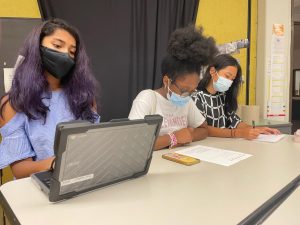Paper
October 5, 2021
For hundreds of years, assignments have been written. Smart Boards and computers were unheard of as teachers printed out all learning materials. Some believe that the traditional methods still work and that paper is the way to go.
Paper is the preferred route for English teacher Leslie Lindsey. Lindsey believes that people spend more than enough time on devices already and would like to provide students with a chance to get off of technology.
“When I have the opportunity to put a printed text in front of a student or am able to assign a writing piece that can be handwritten, I’m giving them a break and allowing them to practice skills that are becoming somewhat lost,” Lindsey said. “I love giving students feedback on their writing, and I find that typing into comment boxes next to online documents is just not what is best to transfer learning from piece to piece.”
Lindsey found that the quality of punctuation and grammar has decreased since the start of digital assignments. Due to computer technologies catered to students, spelling memorization and learning proper grammar is less necessary.
“My English one students complain that they have bad handwriting and don’t spell well. This is just fuel for my fire,” Lindsey said. “We don’t have to rely on our memory for everything or have 15 tabs open. We can sit down, problem solve and put the pieces of the puzzle together right in front of us. [Then we can] move forward into a new piece.”
Sophomore Dee Tummala saw these improvements in her handwriting and organization. She found drawbacks in slow websites and reliance on internet connection.
“I preferred paper assignments because I got satisfaction in completing them. I got to keep my work organized and have a hard copy,” Tummala said.
Writing notes on paper is also proven to help students learn better, as shown in a study by Scientific American reports Pam Mueller and Daniel Oppenheimer. Lindsey felt these benefits disappeared with the rise of digital curriculum.
“I feel like the student lost the ability to see the big picture in our curriculum, that our ability to read and write is forever evolving, and instead it became a list of tasks to accomplish,” Lindsey said.
A study from the University of Tokyo also demonstrated that students writing on paper accomplished their tasks more quickly, along with showing more brain activity surrounding memorization of their work. Lindsey has seen these positive impacts first hand while using paper assignments.
“I hope that more paper assignments and reading experiences with actual books in their hands will give all students, especially students who were virtual last year, a much needed break from the screen,” Lindsey said.


![Mid-air, junior Donovan Qualls leaps for the soccer ball during the varsity game against Ladue on Oct. 21. As the goalie, Qualls focused on keeping the ball away from the box and the back of the net. “[Being a goalie] is pretty tough. You have to be the commander of the team in your box, step up for your team, be loud, and have a lot of communication. Once you do it for a while, it gets fun. I really enjoy being the backbone of my team,” Qualls said.](https://pwestpathfinder.com/wp-content/uploads/2025/10/DSC7136-Enhanced-NR-1200x798.jpg)

